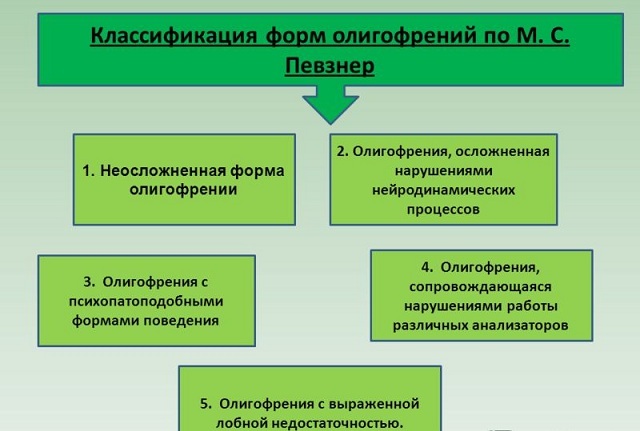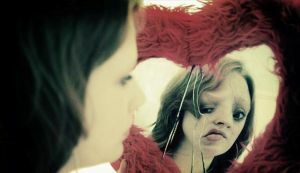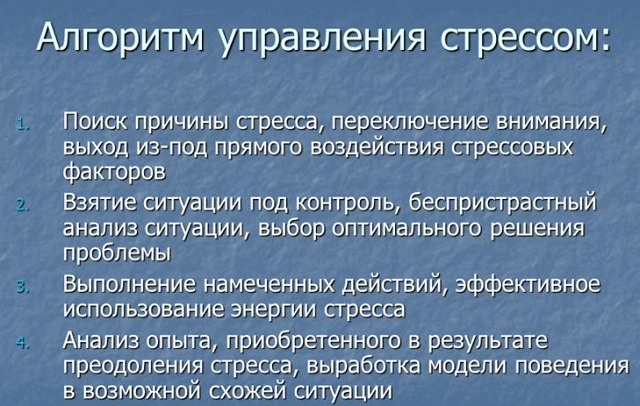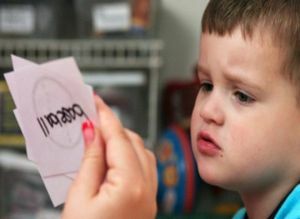 Oligophrenia is a persistent mental underdevelopment, or mental retardation. The reason is organic brain damage, which can be both congenital and acquired during early childhood.
Oligophrenia is a persistent mental underdevelopment, or mental retardation. The reason is organic brain damage, which can be both congenital and acquired during early childhood.
The obsolete breakdown of oligophrenia into 3 stages( debility of idiocy idiocy) is not currently used by doctors for ethical reasons. They prefer neutral terms, based on the intelligence factor. The higher the coefficient, the less pronounced the stage of oligophrenia:
- 50-70 points - easy;
- 35-50 - moderate;
- 20-35- heavy;
- is less than 20 deep.
But the traditional division of oligophrenia in the 3 stages gives a clearer picture:
- debility is the easiest and most common form of mental retardation.
- imbecility is average.
- idiocy is a deep one.
Congenital mental retardation can be obtained:
- during fetal development;
- during delivery.
Acquired debility occurs usually at the age of up to 3 years, facilitated by:
- craniocerebral trauma;
- severe viral neuroinfections( meningitis, encephalitis).

Contents of
- Who is he, a man with slight dementia?
- Stages and degrees of debility
- Childish debility and its features
- Emotional aspect of
- Thinking peculiarities
- Diagnosis and tests
- Eisenka test
- Test of Voinarovsky
- Evaluation of speech development
- Torrance test
- Correction and assistance
- Preventive measures
Who is he, a man with a lightdementia?
Degeneracy is the most common and easy variant of mental inferiority. By degree, the disease can be mild, moderate and severe. By dominant manifestations: atonic, stenic, asthenic, dysphoric.
Patients remember any information slowly, forget fast. They do not know how to generalize, they do not know the abstract concepts. The type of thinking is specifically descriptive. That is, they can only talk about what they saw without making any conclusions or generalizations. They have failed to understand the logical connections between events and phenomena.
Patients with oligophrenia in the degree of debility are almost the most honest people in the world. But not from high moral considerations. These people are simply not able to fantasize. Except for the rare, pathological cases described in the judicial practice, they can only talk about what they saw.
When talking immediately notes: speech disorders, its monotony, bezemotsionalnost, poor vocabulary, a primitive construction of proposals.
Sometimes such phenomenon as giftedness in some areas against a common pathology is added: the ability to mechanically memorize huge texts, absolute hearing, genius in mathematics, artistic gift.
Patients do not like changing the situation. Only in a familiar environment feel confident, protected and even capable of independent life. 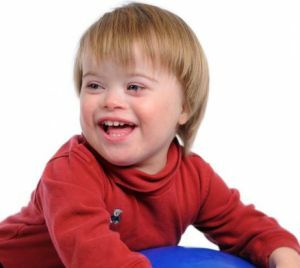
They are highly suggestible, which is why they are easy prey for criminals who use them like zombies. Trusting oligophrenics is easy to convince in something, to impose their point of view, which they will perceive as their own. Out of their environment, often uncontrollable and unreasoning fanatics come out who never change their "own" beliefs.
Will and emotion are almost undeveloped. They are guided by instincts: sexual, food. Sexual promiscuity is an unpleasant phenomenon, which causes disgust among others.
In persons suffering from debility, instincts almost can not be controlled and corrected. Nutritional instinct is the basis of the basics. They eat a lot, are indiscriminate in food, they have a poorly developed sense of satiety.
In general, with successful socialization, they are excellent spouses( suggestible), are not prone to conflicts, are very obedient( there is no one's judgment).
They are easy to manage. Because of their suggestibility and controllability, they can be, as quite adequate members of society, and absolutely antisocial, viciously vindictive and cruel.
The character can be very attractive: kind, like children, heartfelt, devoted to those who care about them. Along with them, there are aggressive, spiteful, stubborn, vindictive persons.
Degeneracy is expressed in excessive excitability, and in obvious inhibition( in the common people, the latter are called "brakes").
Stages and degrees of debility
There are three stages depending on the IQ:
- light : IQ of 65-69 points;
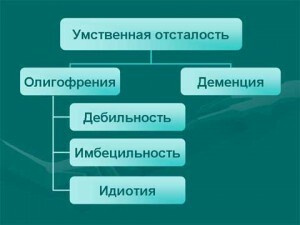
- moderate : IQ of 60-64 points;
- heavy : IQ 50-59 points.
Also distinguish such types of debility:
- Atonic .Characterized by the fact that patients demonstrate strange, devoid of motives behavior.
- Asthenic .Patients are emotionally unstable, quickly get tired of coming to mental and physical exhaustion.
- Stenic .This degree has two poles. On one: good-natured, sociable, lively people. On the other: quick-tempered, emotionally unstable, uncontrollable.
- The dysphoric .This is the most dangerous degree of the disease: the mood of patients in this group is aggressive, often aimed at destruction and pogrom.
Childish debilism and its features
It is rather difficult to recognize that a child has a debility, until he goes to the 1st grade. On his face, he has no obvious signs of the disease.
At the preschool age, it is easy not to notice the signs of mental retardation. Features of development, individuality of personality, type of temperament. ..
Children-tornado, children-silent - all this does not mean anything. Only with admission to the first class is gradually revealed a menacing sign: these children almost do not learn the program of study for any of the subjects.
From the moment of apprenticeship, when it's time to remember, read, count, retell the heard, begin to show signs of debility. Such children are difficult for something to teach because it is impossible to attract their attention for a long time, especially, to fix it.
But the diagnosis should be made early: many small "tornadoes" and "tsunamis" suffer from a lack of attention. But unlike restless, live, hyperactive children, a child with dementia is not so noisy and restless. At school, disaster begins. It turns out that he is incapable of training in an average, ordinary program.
To blame them for being lazy, blaming, forcing, trying to "drill" knowledge into the head is useless. So you can only intimidate your "special" child and make him suffer.
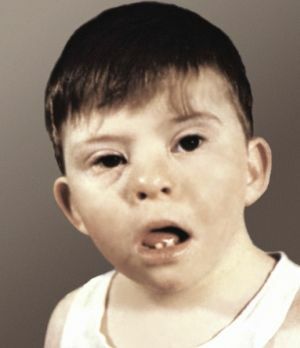 They do not understand the conditions of the task, they do not grasp the connections between things and phenomena. Can not solve logical problems( remove unnecessary, or add missing).Grammar and spelling are not given to them.
They do not understand the conditions of the task, they do not grasp the connections between things and phenomena. Can not solve logical problems( remove unnecessary, or add missing).Grammar and spelling are not given to them.
The difficulties with retelling the read or heard are due to the fact that those suffering from debility can not long remember what they heard.
The low power of words and the inability to construct phrases from them, the wrong arrangement of words and syllables - all this prevents them from being good orators.
But this children is good at serving yourself, helping to lead a household.
Emotional side of
In children suffering from oligophrenia in the stage of debility there are two poles of emotionality:
- on the first pole of : affable, kind, affectionate;
- on the second : evil, morose, aggressive.
There are also two poles of activity:
- extremely active children - at one pole;
- extremely slow - on the other.
Prevalence of primitive instincts, sexual disinhibition deprive them of attractiveness in the eyes of society. Teenagers do not know how to hide it: they stick to girls, they masturbate publicly.
Credibility, suggestibility - the terrible qualities of these people in criminal hands. They do not consider the instructions given to them and do not know how to calculate the consequences of their deeds.
Features of thinking
"Special" children can not generalize, draw conclusions, only concrete thinking is available to them. For them, abstractions are inaccessible.
They do not have their own judgments about what's going on. They easily adopt other people's opinions and beliefs and consider them their own."Not like everyone else" can see only the outer part of the phenomenon. The underwater part of the iceberg is not for them.
Patients do not have children's curiosity, inquisitiveness of mind, they are not "why", they are not interested in "what, how, for what".
Compensated by the lack of imagination, curiosity and abstract thinking of an excellent orientation in situations of everyday character. They do not go to conflicts, obedient and complaisant.
Diagnosis and tests
With the onset of the first year in school, learning difficulties usually make one think about the reason that causes them. The first academic year is the time of diagnosis. Diagnose debility after a survey of a psychiatrist, neuropathologist, interviews with a psychologist, consultations with a speech therapist.
Psychological tests plus a quantitative measurement of intelligence and personality factors help in the diagnosis.
The degree of the disease is identified by evaluating the IQ.There are a lot of methods. Their goal - to measure the properties of the psyche in the field of thinking, intelligence and speech. For children and adults, tests are offered according to age.
Eysenck test
Eysenck test( intelligence test) - determines the level of development of intellectual abilities. This is a questionnaire, with forty tasks in logic, mathematics and linguistics. The assignment is given for 30 minutes. The scale of the test starts from the lower limit of 70 to its peak of 180 points:
- the upper limit of ( 180) indicates the genius of the subject, so rarely does anyone achieve it: geniuses are not so much in the world;
- variant of the norm: 90-110 points;
- is less than 70 - cause to be alarmed, as 70 points is the threshold separating healthy from patients;
- everything, that is less than 70 -a large value suggests a pathology.
The test of Eysenck itself does not give grounds for diagnosing. It makes sense only in conjunction with other techniques to establish the degree of intelligence development.
Test of Voinarovsky
The test of Voinarovsky( on logical thinking) is a certain number of statements from which one must choose the right one. The test is good because it does not require mathematical knowledge, which the preschoolers do not yet have.
It is best to start with the simplest tests: "remove an object", "add a number of pictures missing."

Evaluation of speech development
To establish how much the child is fluent in writing and speaking, such tests will help:
- insert missing words into the story;
- retell the passage from read independently, or heard from the tester's mouth;
- correctly place commas in the text;
- come up with a phrase from individual words.
Torrance Test
The Torrance test determines the degree of the patient's gift. It consists in tasks using figures. Various figures are given out to the test person:
- a figure in the form of an egg, the child is suggested to represent something similar to this object in the drawing;
- tasks with 10 cards and fragments of figures;
- sheet with painted pair straight lines.
The test determines creativity, non-standard thinking and the ability to analyze and synthesize.
In order not to be mistaken with a diagnosis, it is necessary, apart from tests, to consult different specialists, clinical research data, information about the child's family, the environment in which he grows and is brought up. We also need to remember his personal characteristics, so as not to confuse the silent genius( Einstein) with the mentally retarded.
Correction and care
In general, symptomatic treatment: 
- psychotropic and nootropic drugs;
- restorative;
- anticonvulsant and dehydration;
- metabolic.
Quickly tired and sluggish patients prescribe psychoactive drugs that make them more active and active.
Neuroleptics and antipsychotics are prescribed especially irritable, a little extinguishing and "slowing down" their mental reactions.
With speech therapists, psychologists, teachers are engaged. In childhood, such treatment is especially necessary. It helps to better absorb knowledge, acquire skills, develops independence, teaches us to orient ourselves in the world and to socialize.
 The main goal of medicine is to help the patient to adapt to society, learn to live independently, master simple specialties. Centers for rehabilitation and social adaptation teach life in society.
The main goal of medicine is to help the patient to adapt to society, learn to live independently, master simple specialties. Centers for rehabilitation and social adaptation teach life in society.
The success of adaptation depends on properly organized conditions of study, work, well-established everyday life. It is not necessary to demand the impossible from children: they must study in specialized schools corresponding to their level of development, work in areas where attention, initiative, and creativity are not required. Proper adaptation can give the patient everything: work, family, friends and a decent standard of living.
Preventive measures
Prevention measures are a set of simple rules and recommendations:
- to identify in future mothers diseases that provoke the development of malformations in the fetus: rubella, measles, venereal diseases;
- necessarily good obstetrics, preventing birth trauma, fetal hypoxia, its infection;
- a healthy lifestyle of a pregnant woman, excluding smoking, drinking, taking drugs and medicines that can harm a child;
- activities aimed at preventing infection of a woman with infectious diseases.

